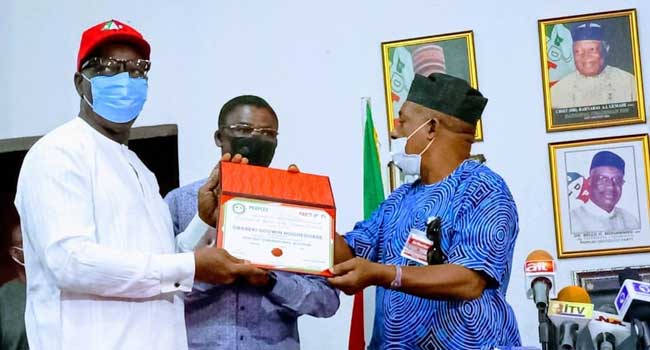Opinion
Edo Decides: Early signs of a transition from party-based elections?

In January 2019 the biggest catchphrase was ‘Nigeria Decides’. This catchphrase was used extensively across social media handles during the period. It indicated that Nigerians were going to the polls to decide on their own leadership with their votes. Today, as in the last general elections, the question still comes to mind if it really is Nigerian’s doing the deciding when it comes to the country’s political leadership.
Over one year later, observing the Edo elections remotely, the new catch-phrase is ‘Edo Decides’. The Edo state elections also came out as a great win for the PDP and an exemplary story for incumbent governor’s. Obaseki had to decamp after being ousted in the election primaries by his former political party the APC. He single-handedly fought against his former political party, stood against the desires of his former political godfather, campaigned against the incumbent political party, and some say, against the Oba of Benin – and he won.
A popular quote has emerged following the elections ‘Edo No Be Lagos’ as a reference to the state being less influenced by state machinery and the incumbent political party, and more reflecting the will of the people. Street-to-street level jubilation has been ongoing in Edo state because of how people have ‘felt’ about the clashes between the previous governor and the incumbent one, as well as the two leading political parties.
After a long and intense campaign which included: APC leader Bola Ahmed Tinubu’s online video calling for the voting out of incumbent governor Obaseki, a trending video of Obaseki rallying people to fight against godfatherism with the ‘FEM’ theme song by Davido, and an unbelievable amount of police officers dispatched to Edo state for the election, the whole drama ended in a win for Obaseki.
Is a win for the governor a win for the people?
The PDP victory in Edo state is a reflection of what often happens when party interests conflict with the interests of the people. It is also an example of the relational power of super-powers: the United States imposition of a ban on election riggers from Nigeria into the US came as a strong message in a timely period and significantly affected the outcome of the election.
However, the outcome of the Edo election still reveals a disturbing similarity to previous elections in Bayelsa, Kogi, and the general presidential election across Nigeria – they indicate that numbers alone don’t mean it is Nigerians deciding. Obaseki won the election with slightly over 300,000 votes, which in total is roughly only 12% of the voting population of Edo state.
Still, Obaseki even stands as an exemplary case of success in this light. In all the other elections that have been carried out since the digital age of election circles, a smaller number of people have made it to the voting booth to cast their votes. Voter registration and the number of people who vote in Nigerian elections are abysmally low. President Muhammadu Buhari’s victory in the 2019 elections, which was the most expensive election in the history of Nigeria with around 15million votes, in 2019, in the most expensive election ever held in Nigeria, was also only 13% of total eligible voters.
The victory numbers look large but when put in comparison to the country’s ‘votable’ population it is a terribly small number. This disturbing statistic has to change. Even though more people are heading to the polls as against in the past, this huge gap between the number of registered voters, and those who eventually reach the polls to elect their leader still indicates that Nigerians aren’t yet the ones doing the deciding.
A shift in the strength of opposition?
These events are not isolated. The ruling political party inherited a hard country. The journey from 2015 to now has included Nigeria’s fight with an economic recession, a 13year insurgency, a fifty-year-old ethnic rivalry threatening the unity of the country, and in the aftermath of the 2015 elections – a bitter political divide. The PDP platform, on which Godwin Obaseki won, had lost popularity in the 2015 elections which resulted in the defeat of incumbent former President Goodluck Ebele Jonathan.
Today, the country also battles high levels of kidnapping, herder-farmer conflicts, ISIS presence in West-Africa, and a very difficult economy heightened by the global Coronavirus pandemic. More pressure for performance is mounting on the country and in totality, leaders on the African continent. The Coronavirus has affected the distribution of funds, and the usual ways of politicking to bribes and cash distributions have been severely affected. Politicians in the Edo state elections were forced into common ground, without overreaching state influence, and this resulted in a victory for the opposition.
Governor Obaseki did not mince words when he thanked President Muhammadu Buhari, in his words – for defending our democracy, and allowing the INEC and the security services to perform their constitutional functions without interference. Even though Obaseki only swapped to the PDP in June, he was still able to garner the people to head to the polls and vote for him, in spite of fears from the Coronavirus.
The Edo elections falling into the hands of the opposition can be seen as a message to the current political party, that party politics alone will not cut it. There is strength in compromise and in the will of the people. Obaseki won the election on both the platforms of the APC and now the PDP. Citizens are edging towards good governance now more than ever.
____________________________
Article written by Tahir Sherriff
Disclaimer
It is the policy of NewsWireNGR not to endorse or oppose any opinion expressed by a User or Content provided by a User, Contributor, or other independent party. Opinion pieces and contributions are the opinions of the writers only and do not represent the opinions of NewsWireNGR






